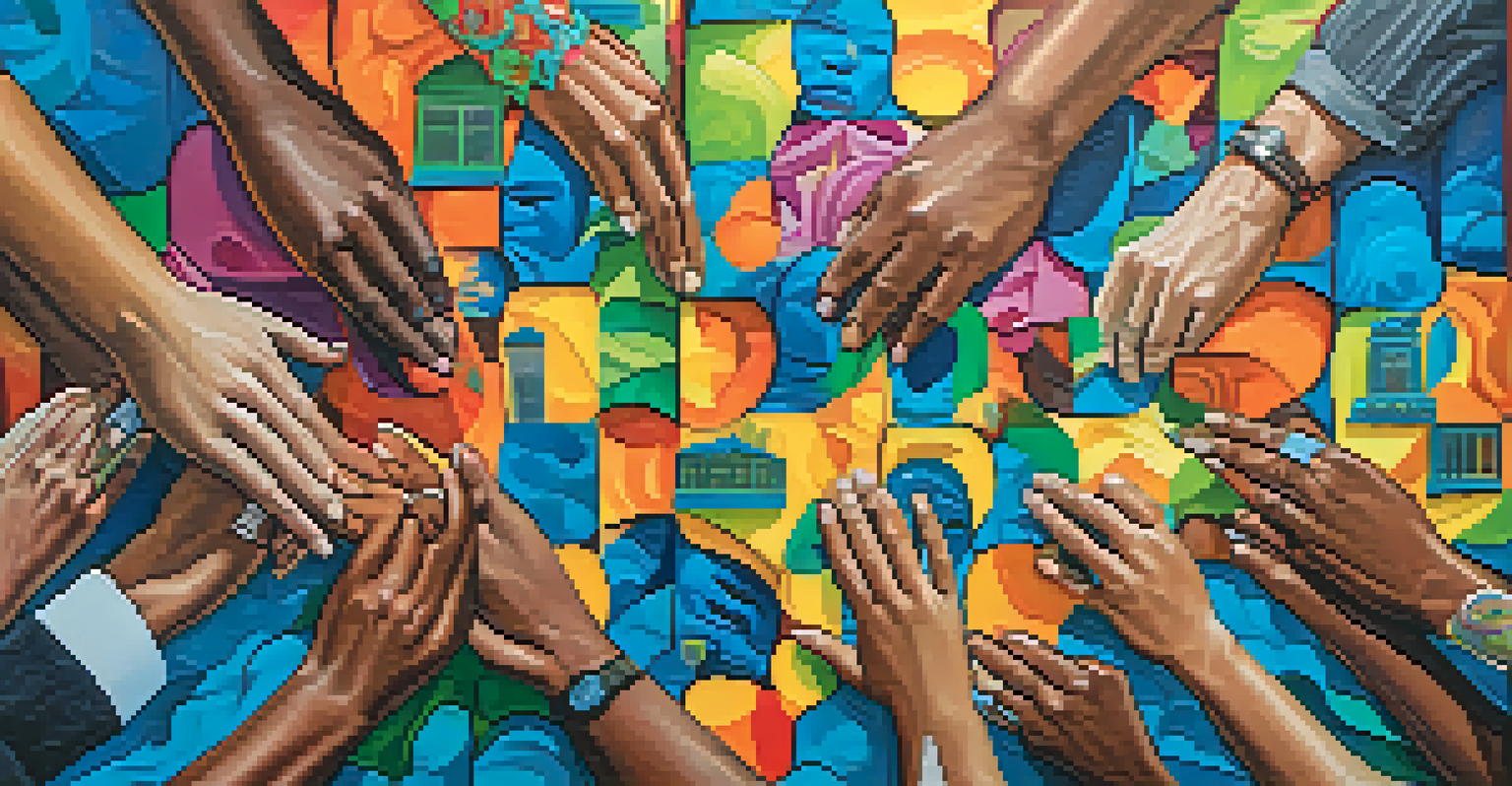Exploring the Diversity of Chicago's Nonprofit Organizations

Understanding the Role of Nonprofits in Chicago
Nonprofit organizations play a vital role in addressing social issues in Chicago. They fill gaps where government and private sectors may not reach, providing essential services to those in need. Whether it's food security, education, or health care, nonprofits are often on the front lines of community support.
Nonprofits are the backbone of our communities, addressing the needs that others overlook.
In Chicago, these organizations vary widely in focus and approach, from small grassroots efforts to large, established institutions. This diversity allows them to cater to the unique needs of different communities across the city. By understanding their missions, we can appreciate how they contribute to the city's overall well-being.
Moreover, nonprofits foster a sense of community and belonging. They bring people together, encouraging collaboration among residents, volunteers, and donors. In this way, they not only serve individual needs but also strengthen the social fabric of neighborhoods.
Highlighting Key Areas of Focus Among Nonprofits
Chicago's nonprofit sector encompasses a variety of focus areas, each addressing specific community needs. For instance, organizations like the Greater Chicago Food Depository tackle hunger by providing food access to those in need. Similarly, groups like Chicago Youth Programs work to empower young individuals through education and mentorship.

Other nonprofits focus on arts and culture, environmental sustainability, or mental health support. This diversity ensures that a wide range of social issues are being addressed, showing the city's commitment to holistic community development. By prioritizing various needs, nonprofits contribute to a more equitable society.
Nonprofits Address Community Needs
Nonprofit organizations in Chicago fill crucial gaps in social services, addressing issues like hunger, education, and healthcare.
These organizations often collaborate with one another, pooling resources and expertise to maximize their impact. Such partnerships can lead to innovative solutions and a more comprehensive approach to tackling social challenges. This interconnectedness is a testament to the strength and resilience of Chicago's nonprofit landscape.
The Impact of Community Engagement on Nonprofits
Community engagement is a cornerstone of successful nonprofit work in Chicago. Many organizations rely on local volunteers who bring their unique skills and perspectives to the table. This not only helps nonprofits operate more effectively but also builds a sense of ownership among community members.
The greatness of a community is most accurately measured by the compassionate actions of its members.
Volunteering can also lead to deeper connections within neighborhoods, fostering relationships that span beyond the organization itself. When individuals come together to support a cause, they create a ripple effect, inspiring others to get involved and contribute. This collective action can lead to significant change on both local and city-wide levels.
Furthermore, engaged communities are often more resilient. By working together, residents can identify their own needs and advocate for solutions. Nonprofits play a crucial role in facilitating these discussions, empowering individuals to take an active role in shaping their environments.
Challenges Faced by Nonprofits in Chicago
Despite their essential roles, Chicago's nonprofits face numerous challenges. Funding is a primary concern, as many organizations rely on grants, donations, and fundraising events. Economic fluctuations can directly impact their ability to sustain operations and serve the community effectively.
Additionally, competition for resources among nonprofits can create a challenging environment. Organizations may find themselves vying for the same funding sources or volunteer support, which can lead to tension rather than collaboration. Addressing these issues requires creative solutions and a commitment to cooperation.
Collaboration Strengthens Impact
By partnering with one another, nonprofits can pool resources and create innovative solutions to tackle social challenges more effectively.
Nonprofits also grapple with the demands of maintaining visibility and awareness in a crowded marketplace. In a city as vibrant as Chicago, standing out and effectively communicating their missions is vital for attracting support. This is where strategic marketing and community outreach efforts come into play.
The Role of Technology in Nonprofit Operations
In today's digital age, technology plays a pivotal role in how nonprofits operate and connect with their communities. Many organizations leverage social media platforms to raise awareness about their missions and engage with supporters. This online presence can amplify their reach and attract a broader audience.
Moreover, technology aids in streamlining operations, from managing donations to coordinating volunteer efforts. Software tools help nonprofits track their progress and measure impact, enabling them to make data-driven decisions. Such efficiencies allow them to focus more on their core missions rather than administrative tasks.
However, the digital divide remains a challenge, as not all organizations have equal access to technology or training. Ensuring that all nonprofits can harness the power of technology is essential for leveling the playing field. By investing in tech support and training, we can help all organizations thrive.
Success Stories: Nonprofits Making a Difference
Stories of success abound in Chicago’s nonprofit sector, illustrating the profound impact these organizations have on their communities. For instance, the Chicago Coalition for the Homeless has made strides in advocating for policy changes and providing resources to those experiencing homelessness. Their work has led to increased awareness and improved support systems.
Another inspiring example is the Arts and Business Council of Chicago, which connects artists with business professionals to foster creativity and economic growth. Through mentorship and collaboration, they’ve empowered countless artists to thrive in their careers, showcasing the power of synergy between sectors.
Technology Enhances Nonprofit Operations
Leveraging technology allows nonprofits to streamline operations, reach a wider audience, and improve their overall impact on the community.
These success stories not only highlight individual organizations but also serve as a reminder of the collective effort required to address complex social issues. By sharing these narratives, we can inspire others to get involved and support the vital work being done across the city.
The Future of Nonprofits in Chicago
As Chicago continues to evolve, so too will its nonprofit landscape. Emerging trends, such as increased focus on equity and inclusion, are shaping the future of these organizations. Many nonprofits are re-evaluating their approaches to better serve historically marginalized communities and ensure that all voices are heard.
Additionally, community-led initiatives are gaining momentum, empowering residents to take charge of local issues. This shift towards grassroots movements fosters a sense of agency and ownership, leading to more sustainable solutions. As nonprofits adapt to these changes, they will play an even more integral role in shaping the city’s future.

Ultimately, the strength of Chicago's nonprofit sector lies in its diversity and resilience. By continuing to support these organizations and championing their missions, we can build a more vibrant, inclusive, and equitable city for all.